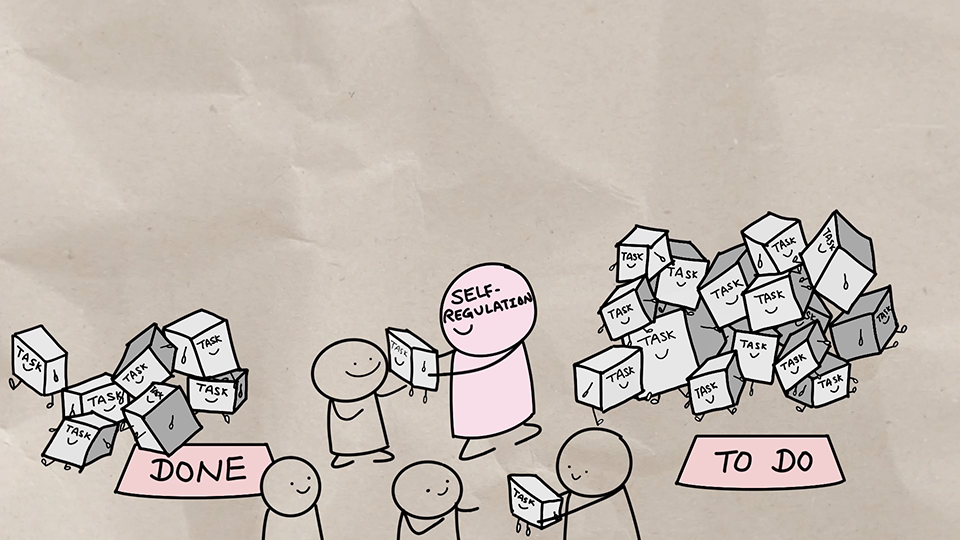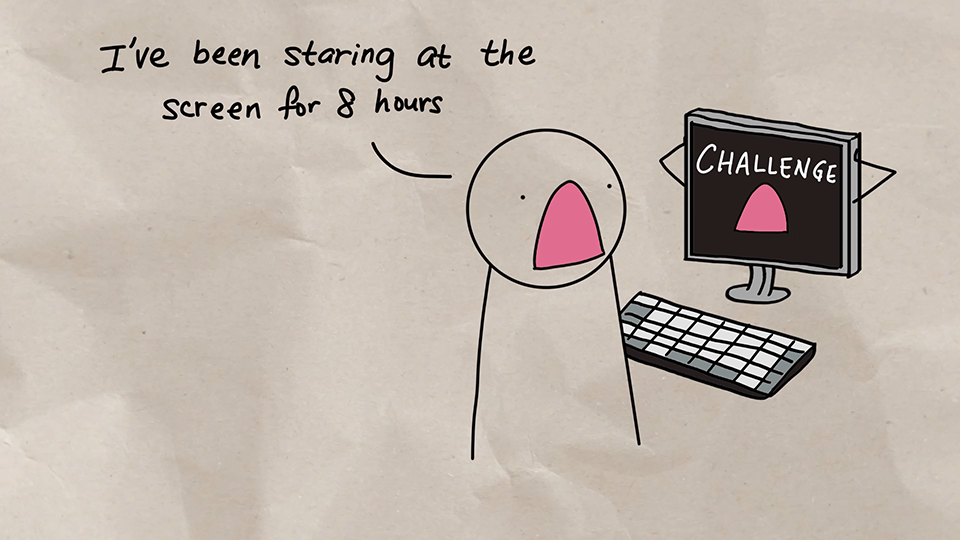Reflect on your use of self-regulated learning
You and your team members are exploring your current self-regulated learning aptitude, including how you assess progress. This process will help you determine what you need to work on so that you're more strategic with your training and your project.
Reflect on your use of self-regulated learning
Earlier you learned about metacognition. Remember that metacognition is an awareness of your own thoughts and actions and that it's the first step in self-regulated learning. Use the following questions to reflect on your own approach to learning and tackling challenges. Optionally, note your thoughts on a device or on paper.
Getting started and working on a project or task:
How do you approach a new project or task?
Do you make a plan? Do you start right away? Do you discuss the project with anyone?
What conditions make it easiest for you to do your work? How often do you do your work under these ideal conditions?
Have you ever used the three-step self-regulation process? How did it work for you?
Getting help:
What do you do when you don't understand something or are struggling to complete a task?
How long do you try to work through an issue before you ask for help?
Where do you usually go for help?
Do you bring what you've tried with you when you ask for help?
Managing tasks:
When you have a challenging project, do you often feel overwhelmed by the enormity of it?
Have you tried breaking down large tasks into smaller ones? How did that help you?
Does the following statement apply to you? "I typically don't let myself celebrate the small accomplishments in a project until it's fully completed."
Does this statement apply to you? "I feel most motivated when I celebrate small successes, so I find it helpful to break down large tasks into smaller ones."
Tip
Remember that breaking down a large task into smaller ones can give you the opportunity to celebrate smaller successes more frequently. This strategy will help you persist when completing tasks seems challenging.

Assessing progress:
Do you compare your work and progress to that of the people around you?
Do you often measure a project's progress by the time you've spent on it rather than how much work you've accomplished?
When you accomplish a task or a goal that you set for yourself, do you feel successful?
Do you sometimes work on a project for hours and feel surprised that you don't know what you've done in that time period?
Do you keep a log or record of your project's tasks, the troubleshooting steps you've tried, and their results? Did it help you? If so, how?
Does this statement apply to you? "Even when I'm doing well, if my peers are doing better than I am, I feel I've failed."
Does this statement apply to you? "I regularly compare my progress to my long-term goals, which makes me feel that my efforts are inadequate."

Tip
Both long-term goals and the success of those around you can motivate and inspire you. However, to accurately assess your progress, don't compare where you are now to your long-term goals or to the progress of those around you. Compare where you are now with where you were when you started.
Take a moment to consider and note any extra insights you've gained about self-regulated learning. Also think about particular steps you could take to make positive changes. Consider these questions:
In general, how developed do you think your self-regulation skills are?
In what particular areas do you think you can improve?
What steps do you think you should take to improve in those areas?
Reflect on your motivations and goal orientation
Take a few minutes to revisit the three possible training approaches you considered for your team of developers: studying and evaluation, a coding class, or a workshop. Review each training approach while imagining that you're a participant. Use the reflective questions to consider what might motivate or discourage you in those situations. Also, think about which goal orientation or orientations might apply for you. Optionally, note your thoughts on a device or paper. The following table lists the three training approaches:
| Training approach | Description | Reflective questions |
|---|---|---|
| #1: Independent study and then evaluation | Team members will learn by completing assignments on their own. At a certain point, everyone in the team will meet and evaluate each other's work, including senior developers who know the topics well. | How do you feel about the possibility of learning on your own, with no help from others? What does it mean to you to have teammates and senior developers evaluate you? Would it motivate you or hinder your learning, and why? Overall, which goal orientation do you think would most apply to you in this scenario, performance or mastery? |
| #2: Coding class with a test | Team members will participate in a coding class. Everyone will work on assignments and turn them in for a grade. There will be a test, and the person with the highest grade will get special recognition. | How do you feel about the possibility of learning in a classroom setting with assignments and grades? What does getting a grade and special recognition mean to you? Would these things motivate you or hinder your learning, and why? Overall, which goal orientation do you think would most apply to you in this scenario, performance or mastery? |
| #3: Coding workshop | The team will learn together in a workshop setting. There won't be any grading or formal evaluation. Experienced developers will be there to help write, run, and troubleshoot the code. Everyone will work in groups to learn from each other's code. Participants will be asked to volunteer their code samples as solutions to problems. The group will evaluate these samples. | How do you feel about the possibility of learning in a group setting with your teammates and senior developers there to help? Would learning from each other's code motivate you or hinder your learning, and why? Do you think you would tend to offer your code samples? Would you offer them only if you knew they were right? Would you share them if you thought they might be wrong, so you could get feedback from the group? Overall, which goal orientation do you think would most apply to you in this scenario, performance or mastery? |